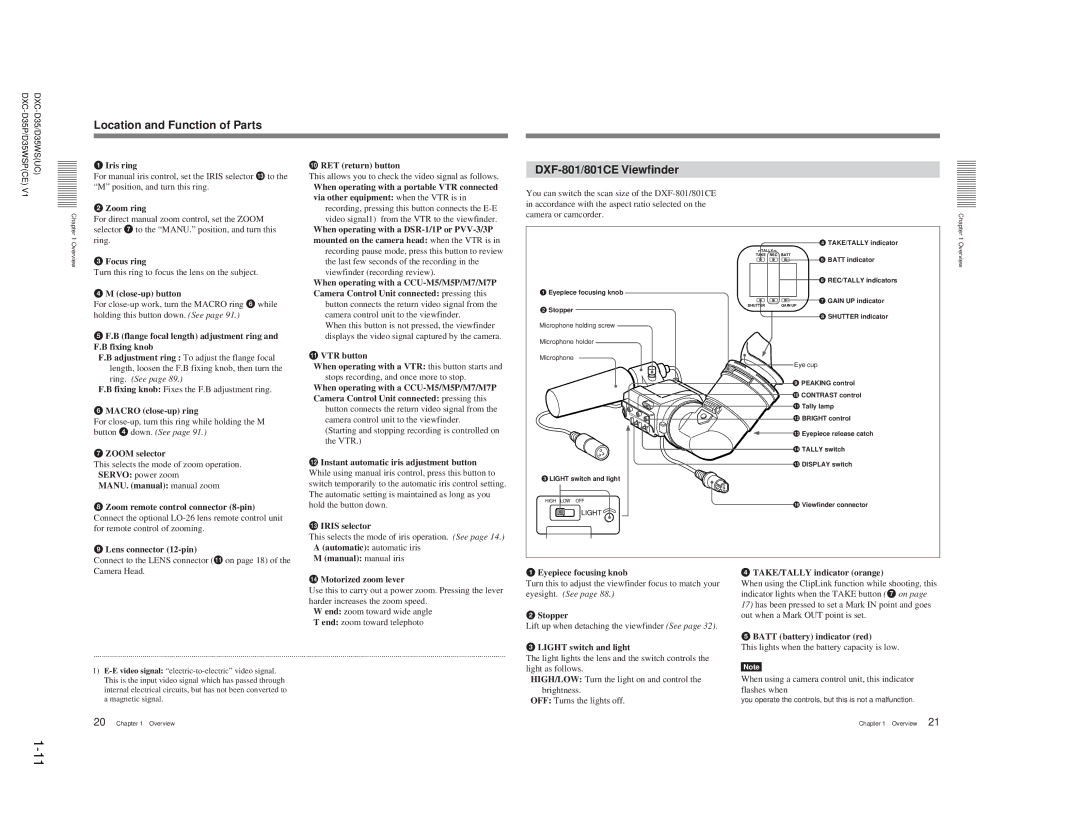
Location and Function of Parts
1Iris ring
For manual iris control, set the IRIS selector qd to the “M” position, and turn this ring.
0RET (return) button
This allows you to check the video signal as follows.
When operating with a portable VTR connected
Chapter 1 Overview
2Zoom ring
For direct manual zoom control, set the ZOOM selector 7 to the “MANU.” position, and turn this ring.
3Focus ring
Turn this ring to focus the lens on the subject.
4M (close-up) button
For
via other equipment: when the VTR is in
recording, pressing this button connects the
When operating with a
mounted on the camera head: when the VTR is in recording pause mode, press this button to review the last few seconds of the recording in the viewfinder (recording review).
When operating with a
Camera Control Unit connected: pressing this button connects the return video signal from the camera control unit to the viewfinder.
You can switch the scan size of the
![]() TALLY
TALLY ![]()
TAKE REC BATT
1Eyepiece focusing knob
SHUTTER | GAIN UP |
2Stopper
4TAKE/TALLY indicator
5BATT indicator
6REC/TALLY indicators
7GAIN UP indicator
8SHUTTER indicator
Chapter 1 Overview
5F.B (flange focal length) adjustment ring and F.B fixing knob
F.B adjustment ring : To adjust the flange focal length, loosen the F.B fixing knob, then turn the ring. (See page 89.)
F.B fixing knob: Fixes the F.B adjustment ring.
6MACRO (close-up) ring
For
7ZOOM selector
This selects the mode of zoom operation. SERVO: power zoom
MANU. (manual): manual zoom
8Zoom remote control connector
9Lens connector (12-pin)
Connect to the LENS connector (qa on page 18) of the
When this button is not pressed, the viewfinder displays the video signal captured by the camera.
qa VTR button
When operating with a VTR: this button starts and stops recording, and once more to stop.
When operating with a
Camera Control Unit connected: pressing this button connects the return video signal from the camera control unit to the viewfinder.
(Starting and stopping recording is controlled on the VTR.)
qs Instant automatic iris adjustment button
While using manual iris control, press this button to switch temporarily to the automatic iris control setting. The automatic setting is maintained as long as you hold the button down.
qd IRIS selector
This selects the mode of iris operation. (See page 14.) A (automatic): automatic iris
M (manual): manual iris
Microphone holding screw
Microphone holder
Microphone
Eye cup
9 PEAKING control |
0 CONTRAST control |
qa Tally lamp |
qs BRIGHT control |
![]() qd Eyepiece release catch
qd Eyepiece release catch
qf TALLY switch
qg DISPLAY switch
3 LIGHT switch and light
HIGH LOW OFF
qh Viewfinder connector
LIGHT
Camera Head.
qf Motorized zoom lever
Use this to carry out a power zoom. Pressing the lever harder increases the zoom speed.
W end: zoom toward wide angle
T end: zoom toward telephoto
1Eyepiece focusing knob
Turn this to adjust the viewfinder focus to match your eyesight. (See page 88.)
2Stopper
Lift up when detaching the viewfinder (See page 32).
3LIGHT switch and light
4TAKE/TALLY indicator (orange)
When using the ClipLink function while shooting, this indicator lights when the TAKE button (7 on page
17)has been pressed to set a Mark IN point and goes out when a Mark OUT point is set.
5BATT (battery) indicator (red)
This lights when the battery capacity is low.
..........................................................................................................................................................................................................
1)
20 Chapter 1 Overview
The light lights the lens and the switch controls the light as follows.
HIGH/LOW: Turn the light on and control the brightness.
OFF: Turns the lights off.
Note
When using a camera control unit, this indicator flashes when
you operate the controls, but this is not a malfunction.
Chapter 1 Overview 21
